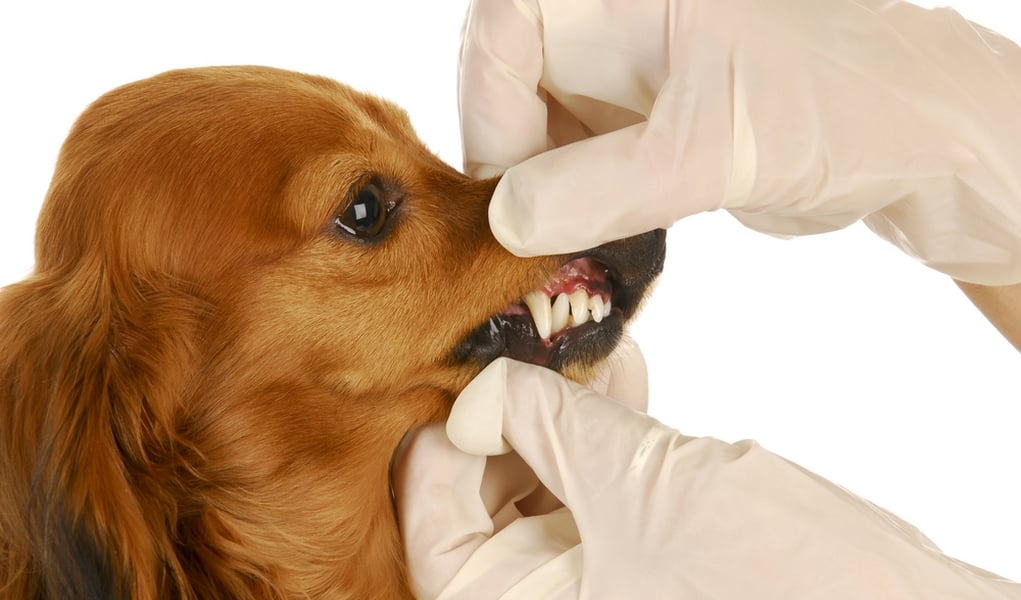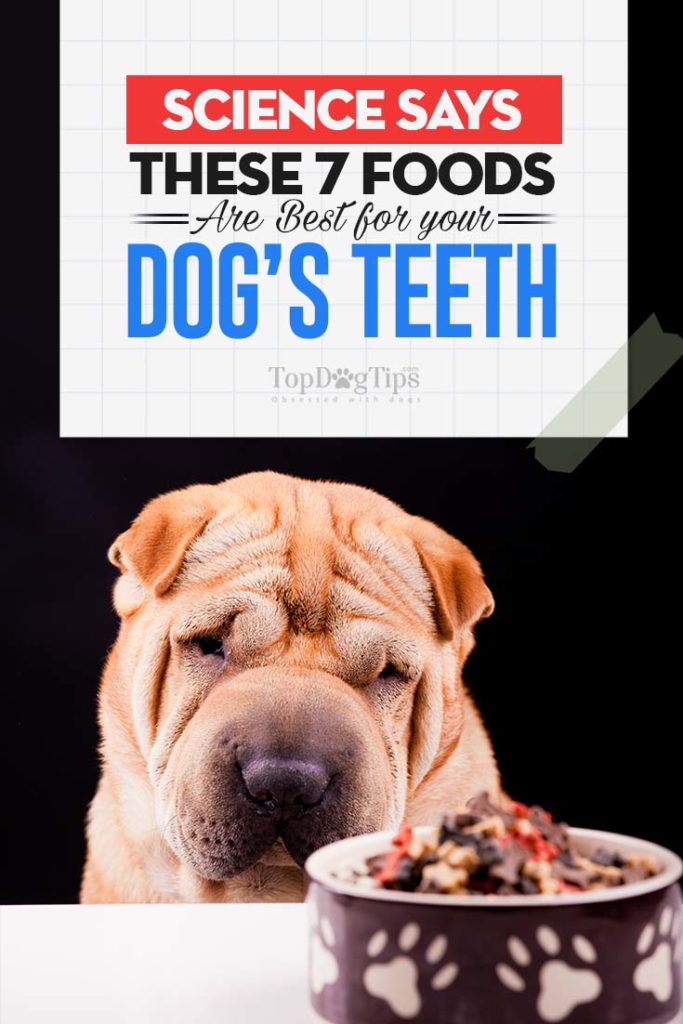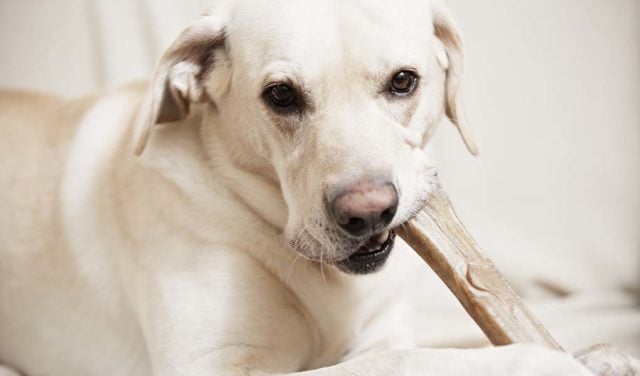
Table of Contents
If you want to see pure bliss, just look at a dog when they’re chewing a bone or antler.
However, while it may seem like our dogs can keep up that enthusiastic chewing for hours on end, their teeth may be causing serious damage and still need to be taken care of.
Studies show (1, 2, 3, 4, 5) that good dog care practice of regularly inspecting and brushing your pet's teeth will prevent many dental problems in dogs, but feeding specific foods or giving them certain things to chew on for dog's dental health can make your pet's dental care even easier for you.
Where humans interact with things on a “see first, touch second” basis, dogs tend to smell first and taste or chew second.
This means that their teeth and mouths get so much more action than those of people. For this reason, any dental issues humans may face are just accelerated in the case of dogs.
Look for changes in appetite caused by chewing, rancid breath, gum disease, discolored teeth, tartar deposits, broken teeth, and various signs of infection.
If you encounter any of these symptoms, consult your veterinarian immediately. Age and genetic issues may also affect the current state of your dog's teeth (6).
Some dogs, unfortunately, will just have bad teeth due to their genes (6), but all hope is not lost.
Studies have shown that other than brushing your dog's teeth regularly, certain types of foods and chews can make a difference in your pup's dental health.
So here are the seven best foods and chews for your dog's dental health and their benefits.
ALSO READ: 10 Science-Based Dog Teeth Care Tips
7 Foods/Chews for Dog’s Dental Health
(backed by science)
1. Dry Dog Food
It's not a myth. While wet or raw meat dog food does have its virtues, the fact is that the majority of veterinarians will prescribe dental health-specific dry dog foods when trying to rebuild the health of a dog's teeth, and there's a good reason for that (7).
Provided, of course, that the dog can still chew.
The main reason for this is that wet dog food tends to stick on teeth or get tucked in between gums.
Over time, this detritus will promote the growth of plaque.
Multiple studies have compared feeding pets wet food vs dry food, and the results show poorer dental health in pets who ate primarily wet/canned pet food (8, 9, 10, 11).
While some popular dog websites like Dog Food Advisor call this a myth, the research is consistent on the matter.
Current evidence shows that there is a just cause to support the dry dog food movement, at least as far as the dog's teeth are concerned.
It appears that with soft or wet dog food, there have been higher incidents of periodontal disease, too (2, 3, 4).
While dry dog food that requires vigorous chewing on the dog's part not only see a lower amount of periodontal disease but, in some cases, prevents it (12).
The reason for this is exactly what you thought it would be, and more:
Because dry dog foods' highly abrasive nature has a scrubbing action on canine teeth that helps to maintain cleanliness and general oral health.
On top of that, studies show that dry dog foods are also responsible for the increased production of saliva in the dog's mouth, which is known to contain immunoglobulins produced in reaction to the antigens found in the mouth (13).
Furthermore, studies show that the ability of dry dog foods to maintain healthy teeth in dogs is greatly enhanced when soluble pyrophosphate is factored into the formulation (14).
This soluble compound, when properly applied, has been shown in research to reduce the formation of painful dental calculus (15).
2. Dental Dog Chews
(manufactured rawhide, bones, and antlers)
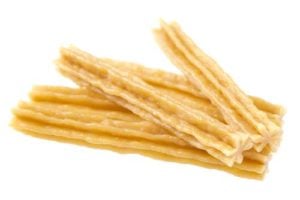 Barring hugs and kisses, nothing brings joy to a dog more than a good chew. By itself, any type of dog chew will not keep your dog's teeth completely clean and healthy, but when used as a supplement, it can be a very valuable tool, which has been backed by scientific research (16, 17).
Barring hugs and kisses, nothing brings joy to a dog more than a good chew. By itself, any type of dog chew will not keep your dog's teeth completely clean and healthy, but when used as a supplement, it can be a very valuable tool, which has been backed by scientific research (16, 17).
Similar to dog dental water additives, dogs who were given oral hygiene chew daily have been shown to display a marked reduction in plaque and calculus development (18).
The efficacy of dog chews can be increased by focusing on their textural properties.
The goal is to strike a balance between a product that is abrasive enough to scrub the teeth but soft enough not to cause pain or damage.
Specific products like the dog dental chews designed for teeth health usually hit the mark.
These types of dental dog chews have also been shown to dramatically reduce the surface formation of plaque, calculus, gingiva, and oral malodor (19).
If you don’t have access to specifically formulated oral hygiene chews for dogs, the more controversial option, like rawhide chews, can be a good alternative in terms of cleaning dogs' teeth.
Alternatives to dental chews that may not be worth it
There are at least three alternatives to dental dog chews that have been observed in studies to clean dogs' teeth – rawhide chews, beef bones, and antlers.
However, there are certain dangers associated with all three of these options, and it may be best to skip them altogether, sticking with toys and chews instead as a way to keep your pet's teeth clean.
In studies, there was greater variability in the rawhide's ability to clean the surface of a dog's teeth (20).
However, there is still evidence to suggest that giving rawhide chews to dogs up to three times per week (which is considered the upper limit of the safe amount of rawhide a dog can consume) can effectively remove significant amounts of supragingival and calculus deposits (21).
You can also go truly old school and give your dog a raw bone to chew on.
The hard and abrasive texture of beef bones (especially femurs) has been shown to clean teeth, massage gums, and provide exercise for jaw muscles (22).
Even raw bovine bones have been shown to have a positive effect in reducing calculus formation when given as a chew.
Equally impressive in their ability to clean teeth are antler chews. Usually harvested from deer and elk antler sheds, these chews make for really great alternatives to beef bones.
The fact that deer and elk shed antlers only once a year does tend to make them more expensive, but their efficiency in maintaining oral health has been proven.
That said, antlers – just like rawhide chews and beef bones – may not be the best option due to their potential hazards for the dog (teeth fractures, choking hazards, and more).
3. Soft Dog Food
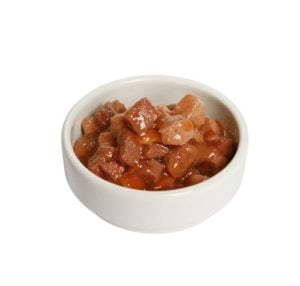 I know I've just mentioned dry dog food as the first food option to feed your pet, but while the merits of dry dog food have been extensively researched and discussed, it is important to not demonize soft or wet dog food. It has its place and certain benefits for dog teeth that, while do not have clear scientific evidence, can be hypothesized from other related studies we have observed.
I know I've just mentioned dry dog food as the first food option to feed your pet, but while the merits of dry dog food have been extensively researched and discussed, it is important to not demonize soft or wet dog food. It has its place and certain benefits for dog teeth that, while do not have clear scientific evidence, can be hypothesized from other related studies we have observed.
For example, water consumption plays a role in the health of your dog's teeth (23).
Most known canned dog foods contain anywhere from 70% to 80% moisture, while dry foods only contain only up to 10%.
Even though the dog is likely to drink water after eating dry dog food, the amount pets drink rarely makes up for how much liquid they get from consuming wet foods.
Wet food can also be judged at the extreme ends of the dog's age range. The teeth of puppies are often too fragile for hard and tough dry food.
Puppies and young dogs are occasionally likely to chip teeth if given dry dog foods.
Likewise, older dogs, dogs with few or no teeth left, will most likely gum their food and then swallow it directly.
The abrasion of dry dog food, which is so good for teeth, can be mercilessly painful on the gums and often leads to raw or bleeding gums in puppies or senior dogs.
For both young and toothless dogs, the act of chewing dry dog food can be so painful or uncomfortable that they may just opt to swallow it whole, in which case there is a potential for choking or stomach issues.
For these dogs, it is best to give them soft or wet food.
For toothless dogs, there is little worry that the food will get stuck on their teeth because they don’t have any, and for younger dogs and puppies, they will lose their “baby teeth” in a couple of months anyway, so there’s really no harm.
RELATED: How to Brush A Dog's Teeth 101
4. Activated Charcoal
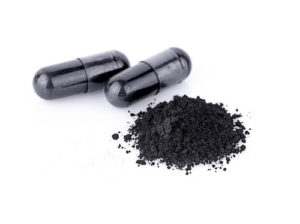 It may be difficult to find a dog gnawing on a huge chunk of activated charcoal. That’s because it is usually baked or mixed into other products. Rawhide disks, for example, can be impregnated with activated charcoal.
It may be difficult to find a dog gnawing on a huge chunk of activated charcoal. That’s because it is usually baked or mixed into other products. Rawhide disks, for example, can be impregnated with activated charcoal.
There is no clear evidence of this, but some experts have suggested that as the dog chews, the rawhide mechanically scrapes the teeth, liberating plaque and calculus deposits.
The activated charcoal then goes on to absorb bad odors and simultaneously kills certain bacteria to further clean and freshen the dog’s breath.
Activated charcoal is essentially activated carbon, and its extremely porous cell structure gives it a large surface area to do its work.
The beautiful thing is that you don’t need a large amount for it to be effective.
It possesses tremendous absorbing abilities, making it the ideal candidate to which toxins can bind.
Many of these toxins are freed up from food sources during mastication and tend to linger in a dog's mouth.
Activated charcoal acts like a sweeper, binding with these errant molecules and turning them into benign compounds to be passed harmlessly through the body.
Want to try it at home? Make sure to discuss it with your veterinarian first.
Then, you can purchase activated charcoal powder for around $5-$10.
Dab some onto your dog's toothbrush and go to town on your pet's teeth as long as your vet has approved it.
Brighter teeth, fresher breath, and better oral health await, according to people who've looked into the research behind activated charcoal but remember that there is no clear scientific evidence or controlled studies done with dogs on this matter.
5. Fiber
While it may be somewhat hilarious to see a dog chomping on mooring rope, this is not the type of fiber I've had in mind.
What I mean is a plasticized (pressed, stretched, and somewhat dried) mixture of food sources containing carbohydrates, fats, vitamins, and minerals.
It has been observed that dogs who chew this product show a significant decrease in plaque buildup, teeth stains, and tartar development.
6. Specifically Formulated Dental Food
What is essentially dry dog food that has been specifically formulated, blended, and processed with oral care in mind?
It is unsurprising to know that this type of dog food is significantly more effective at promoting and maintaining oral health than regular dry dog food.
Studies show that it has the potential to be 39% more effective at fighting plaque and gingivitis than your standard dog food (24).
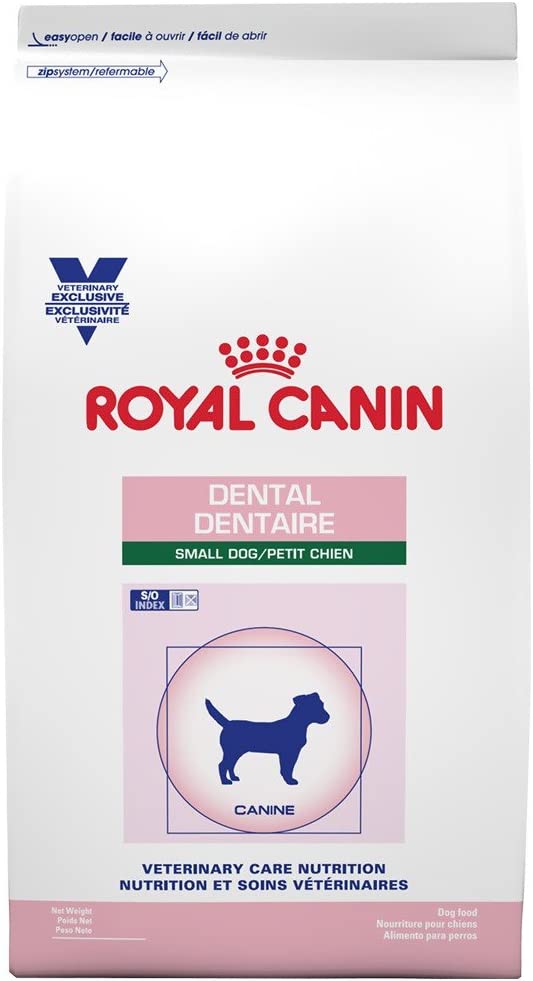 These foods are rare, and the few dental dog food brands that exist are manufactured by reputable vet-recommended companies that are known to research and develop foods related to different health problems in dogs.
These foods are rare, and the few dental dog food brands that exist are manufactured by reputable vet-recommended companies that are known to research and develop foods related to different health problems in dogs.
For Example, Royal Canin's Dental Dry Food, Hill's Science's Dental Health Food, or Oral Care Food.
7. Fruits and Veggies
If you are averse to receiving dental aid from a tube or bag, meaning you don’t like processed goods and commercial dog foods and treats or chews, there is a more natural alternative.
There are a number of science-backed fruits and vegetables dogs can eat, some of which can be specifically good for their teeth.
Carrots are a good place to start (25, 26, 27).
The rough and fibrous nature of carrots basically scrubs your dog's teeth, the same way we've discussed dry dog foods do.
Just make sure you don’t give them too many because carrots are high in natural sugars, which may make your pooch gain weight if given too much, among other hazards of overfeeding.
There are more vegetables to try as well: cucumber, celery, apples and watermelon (all deseeded) may be good in theory for cleaning your dog's mouth when given in moderation, but there's no clear evidence on that.
In terms of herbs, you can try beats, cilantro, and parsley.
Give it to your pooch as treats or diced and mixed into their meals; these herbs will help freshen the breath of your dog, too.
And don’t forget cinnamon!
Non-toxic to dogs when given in moderation, cinnamon can be baked into their favorite treat and eliminates odor-causing bacteria (28, 29).
The rough texture of cinnamon dog biscuits or cookies also helps to physically scrape the teeth of your dog and do away with plaque and tartar.
Finally, coconut oil (not too much as it can cause minute diarrhea) can be used for breath odor control due to the antibacterial, antifungal, and antiviral properties of the lauric acid contained within (30, 31, 32).
Say goodbye not only to odor-causing bacteria but gum disease-causing bacteria as well.
READ NEXT: The Ultimate Guide to Your Dog's Dental Care
Disclosure: We may earn affiliate commissions at no cost to you from the links on this page. This did not affect our assessment of products. Read more here and find full disclosure here.


